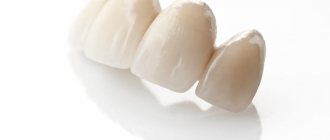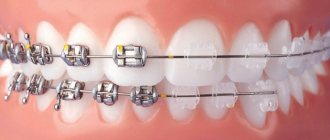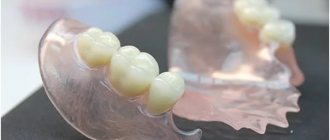General characteristics of titanium crowns
Titanium is one of the metals on the basis of which non-removable orthopedic products are made in dentistry. These include single crowns (hollow “caps” covering the visible parts of the teeth) and bridges (consisting of at least 3 attachments). Sometimes the material serves as the basis for removable dentures, but for this purpose it is used less frequently.
What kind of doctor puts crowns on teeth?
Titanium is a traditional type of metal for fixed dentures. It has the following qualities necessary for orthopedic treatment:
- bioinertness – the material is compatible with body tissues and does not cause negative reactions;
- refractoriness;
- wear resistance and corrosion resistance.
Crowns are made on the basis of pure titanium or its alloy with molybdenum, aluminum, and vanadium. Sometimes gold plating is done on the inside of the prosthesis - this increases the structure’s resistance to corrosion processes and reduces the risk of bacterial plaque accumulation. And the outer side is lined with ceramics.
Titanium is a traditional type of metal for fixed dentures
The amazing effect of titanium in dentistry
The highest strength, resistance to aggressive environments, non-toxicity, biological compatibility, low specific gravity, non-magneticity and availability have made titanium one of the most popular materials in modern dentistry.
Until recently, this metal was used by dental technicians only to impart a white color to plastic prosthetic structures. However, in recent years, titanium has increasingly begun to be used in orthopedics for the manufacture of reliable, durable and aesthetic dental crowns.
Flaws
Titanium crowns have 3 key disadvantages:
- The impossibility of making a structure using the casting method. At temperatures above +800°C, titanium loses its properties. Therefore, prostheses are only milled from it. The technology is complex; it cannot be used to obtain crowns with a perfect marginal fit. A gap forms between the “cap” and its own tissues, where bacterial plaque accumulates.
- Poor adhesion to ceramics. Because of this, chips and cracks quickly appear on the outer part of the prosthesis. In addition, they use exclusively low-temperature ceramics, which are incompatible with other metals.
- Low aesthetics. Titanium-based bridges and crowns do not have the translucency of natural teeth. Therefore, they are not recommended to be placed on the anterior units - they look unnatural against the background of other incisors and canines. Also, low-temperature ceramics are inferior to conventional ones in terms of external characteristics.
In recent years, thin-walled titanium prostheses have been used. They are easier to mill, they better follow the anatomical features, and fit more tightly to the neck of the tooth and the gingival margin.
If the tooth is severely damaged, titanium dentures are not installed
Ceramic and zirconium analogues
An analogue is products made from metal-free ceramics and zirconium dioxide. They are produced by many manufacturers, for example, Swiss Straumann is popular. They are installed for people with metal intolerance and in cases of problems with the oral mucosa (for example, leukoplakia).
Ceramic products do not cause the formation of microcurrents and have high aesthetics. The latter is important when implanting anterior teeth, since over time, bone atrophy occurs at the neck of the implant and it is covered only by the gum. Unlike titanium, metal-free structures allow light to pass through and do not give the gums a bluish tint.
In the image below you can see how they look on MRI and CT:
Indications for installation of metal crowns
Products with coating and a metal frame have excellent endurance characteristics; they are able to withstand heavy loads during the process of chewing food, so they are placed taking into account which teeth need to be replaced. Indications for installation of metal structures:
- the need to protect walls with severe damage to the enamel walls;
- prosthetics on implants;
- the need to support bridge prosthetic structures;
- prosthetics of chewing teeth.
The frames are made according to an individual impression. These are one-piece structures, they fit perfectly on the tooth and tightly grip it. They provide excellent service over time, they are not easily damaged, and there are no chips, enamel cracks or grooves left on the surface of the structure from chewing food.
Sources:
- https://www.vash-dentist.ru/protezirovanie/nesemnyie-p/koronki-np/nuzhno-znat-o-titanovyih.html
- https://www.adent.ru/titanovye-koronki
- https://mirastom.ru/titanovyy-splav
- https://me-dent.ru/protezirovanie/koronki/titanovye
- https://youstom.com/protezirovanie/koronki/vidy/titanovye-koronki-na-zuby.html
- https://zubovv.ru/protezirovanie/nesemnyie-p/koronki-np/nadezhnosti-titanovyih.html
- https://Expail.com/ortopedija/titanovye-koronki.php
- https://zub.clinic/implanty/titan
- https://tvoidantist.ru/protezirovanie-zubov/koronki/s-napyleniem.html
Indications for installation
Typically, a titanium dental prosthesis is recommended for replacing severely damaged or lost units, restoring chewing and aesthetic functions. In addition to these reasons, the structure is installed when:
- insufficient mineralization of teeth, increased abrasion;
- hypoplasia (insufficient development), aplasia (congenital absence of a unit or part thereof) and dysplasia (improper formation of the coronal part) in children;
- injuries, chips and cracks;
- severe tooth decay - if it occupies half the contact area or 2/3 of the height;
- replacement of prosthetic structures made of other materials - as a result of their breakage or repeated treatment of abutment teeth.
The only contraindication is severe tooth decay, in which the root system cannot be preserved. Also, in children, it is not recommended to have prosthetic jaw rows until the units have completely erupted.
How are the manufacturing and installation process?
The titanium frame is made using CAD/CAM technology - computer modeling of the prosthesis, followed by milling from a single block using an automatic installation.
The titanium frame is made using CAD/CAM technology
Otherwise, the production of a dental structure is no different from the creation of other prostheses. It happens in several stages:
- diagnostics - X-rays are used to determine the condition of soft and hard tissues, the presence or absence of inflammatory processes;
- sanitation of the oral cavity - as necessary;
- if necessary, depulpation of the tooth under the crown or repeated endodontic treatment;
- turning the tooth for a prosthesis or, in case of severe destruction, restoring the coronal part with a stump insert - it is also made of titanium;
- taking impressions and making diagnostic impressions;
- fitting and fitting of orthopedic structures;
- if the product is suitable, it is lined with ceramics of a suitable color;
- securing the crown with bond (cement) at the last visit.
Prosthetics take 2-6 weeks. The duration depends on the number of teeth being replaced and the volume of preliminary procedures: treatment of caries, extraction, depulpation, etc.
After installation, the orthopedic dentist prescribes 1-2 follow-up visits. On them, the doctor evaluates how the prosthesis fits. The patient’s task is to report possible discomfort or strange sensations.
After installing the crown, you will need to visit the doctor 1-2 more times.
Implantation stages
Before implantation there is a preparatory stage - during this period you undergo the necessary studies and prepare for the operation. After this, you should not be left with untreated teeth and oral diseases in the acute stage.
The next stage is the actual intervention. The doctor cuts and moves a small area of the gum and places the implant.
Then the abutment is sequentially installed, and after complete healing, the prosthesis itself is installed.
What are the service life and care recommendations?
Titanium crowns are the most durable. Judging by the reviews, they last at least 12 years. And with proper care, the service life reaches 15-20 years.
The service life of the prosthesis itself is indicated with ideal pre-treatment. If the dentist missed inflammatory processes, did not eliminate carious lesions, or poorly obturated the root canals, there is no point in hoping for a long “life” of the structure.
How long titanium dentures last also depends on the patient and how carefully he maintains oral hygiene. Recommend:
- brush your teeth at least twice a day, ideally after every meal;
- clean not only the crowns, but also the tongue, the inside of the cheeks, and gums from plaque;
- use dental floss, brushes or an irrigator to clean the interdental spaces;
- at the end of each cleaning, rinse your mouth with disinfectant solutions;
- if it is not possible to fully brush your teeth, use a mouthwash, floss, or chewing gum - they will eliminate some of the bacterial plaque and food debris;
- undergo a dental examination every six months;
- Remove plaque and stone 1-2 times a year.
Another tip is not to overload the teeth under dentures: evenly distribute the load when chewing on both sides, do not chew hard objects, etc.
Titanium-based crowns are the most durable of all, they can last more than 10 years
Metal ceramics on titanium
Today there are many ways to restore teeth. One of them is metal-ceramic crowns on a titanium frame. This design is highly reliable and has a long service life. It is a good choice for patients who value true aesthetic quality and do not want to spoil the appearance with inconvenient metal crowns that are conspicuous and spoil the appearance. Such crowns are installed very quickly; all work takes on average from a week to 10 days. This is very little compared to other designs.
Metal-ceramics on titanium makes it possible to restore lost or severely damaged teeth. Allows the dentition to look beautiful and aesthetically pleasing. And the client can eat normally and normally, without denying himself almost anything due to missing teeth. In addition, titanium is hypoallergenic, does not cause irritation and feels natural and without discomfort in the oral cavity. This is the best choice for those who want to install metal-ceramic, but traditional crowns made of cobalt-chrome or other material are not suitable for some reason.
The cost of installing turnkey crowns in Moscow
Titanium prostheses are relatively inexpensive. They are at least 1.5-2 times cheaper than metal-ceramic crowns. So, the average cost in Moscow dentistry is as follows:
- 3,000 – 4,500 rubles for a crown made of titanium alloy with aluminum, molybdenum or vanadium;
- 6,000 rubles per unit of pure titanium;
- 6,500-7,000 rubles for a prosthesis with internal gold plating.
The prices shown are for titanium crowns with ceramic lining. Additional costs (treatment, production of a stump inlay, plaque removal, etc.) are calculated individually.
Titanium-based crowns are the best option if you need strong, durable and inexpensive prostheses. They are suitable for replacing and restoring molars and premolars. But it is recommended to install structures made of zirconium dioxide or solid ceramics in the smile area - they look more natural.











